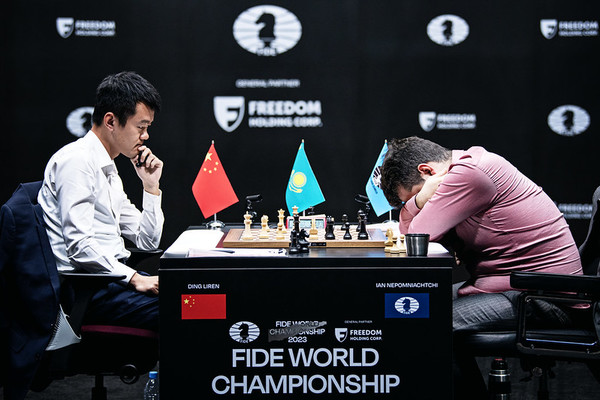
The recent World Chess Championship gave us our first Chinese World Chess Champion: Ding Liren. Ding’s journey to the title was straight out of fiction, requiring improbable dominoes to fall exactly as they did. To commemorate his historic win, here are the top five moments from Ding’s rise to the top of the chess world.
- An Unlikely Opening
The World Chess Championship cycle requires the reigning champion to defend their title every two years against one challenger. To determine who would be the challenger, a tournament called the Candidates tournament is held every other year. The most recent Candidates was held in 2022, and funnily enough Ding didn’t even initially qualify for it. While Ding began to emerge as a true contender for the title before COVID-19 hit, the pandemic had a profound effect on his performance, resulting in a disappointing two years for him. Ding failed to acquire any of the eight spots in the Candidates that were decided via various chess tournaments and criteria. However, Sergey Karjakin, a top Russian Grandmaster who qualified for the Candidates, made several controversial statements about the Russia-Ukraine War which led to an indefinite ban from all chess tournaments. It was decided that the open spot would be given to the highest-rated player not in the Candidates. This happened to be Ding Liren.
2. Most Meaningful “Meaningless Game”
Since the Candidates determines who earns the right as the sole challenger for the World Chess Championship title, coming in as second or last have essentially no difference. Ian Nepomniatchi, the contender for the title in 2021, managed to secure first place by the penultimate round of the tournament — it was mathematically impossible for anyone to catch up to him. Entering the final round of the tournament, US Grandmaster Hikaru Nakamura was in second place, and Ding, just half a point behind him, were matched up against each other. This meant that even just a draw would secure second place for Nakamura. However, against heavy odds, Ding managed to win his match and snatch second place, which came in handy given the following event.
3. Heavy Is the Head That Wears the Crown
Shortly after the Candidates ended, Magnus Carlsen, the reigning World Chess Champion, publicly announced that he would no longer defend his title. Carlsen stated burnout from the World Chess Championship cycle, dissatisfaction with the title match format, and belief that he has more than proven himself as reasons for his decision. The last reason can be attributed to the fact that it was Nepomniatchi who would challenge Carlsen again, which did not interest Carlsen given how one-sided their match was back in 2021. Carlsen even stated outright that he would have defended the title if and only if Alireza Firouzja, a young Grandmaster playing for the French Chess Federation, won the Candidates. As a result, the seemingly meaningless game between Ding and Nakamura in the last round of the Candidates essentially determined who was the other contender for the title.
4. Snatching Victory From the Jaws of Defeat
Classical chess has gained a reputation of being extremely boring and drawn out, ultimately ending in draws most of the time. However, the 2023 World Chess Championship match was anything but that. Six out of the 14 games in the classical format were decisive, which was unheard of in recent history. There was even a stretch from Game 4 to Game 7 wherein players traded wins back and forth like boxers, haymaker for haymaker. After this exchange of blows, it seemed that Ding came out worse, especially because he lost Game 7 by basically freezing on the board, failing to make a move until his time ran out while he was winning. Entering Game 12, Nepomniatchi was up a point — a win meant that he virtually claimed the title since it was difficult to imagine Ding winning two games in a row given his perceived weakened mental state. Finding himself in a losing position by move 19, Ding’s worst nightmares were coming to life, but the universe once again seemed to side with Ding as Nepomniatchi inexplicably blitzed out a move. In a classical match where he had two hours to make 40 moves, Nepomniatchi played a move in seconds that lost him the advantage, the game, and ultimately the title. After Round 12 the match was once again all tied up.
5. Self-pinning for Immortality
Rounds 13 and 14 of the classical portion of the match ended in relatively peaceful draws, so Ding and Nepomniatchi had to play four rapid games as a tiebreaker. The first three rapid games ended in draws and it seemed that the fourth game would end the same. However, Ding did not relent even with the clock winding down. On the 46th move of the game, Ding decided to take a risk and pin his own rook to his king in hopes of Nepomniatchi cracking under time pressure. And as if Ding willed it, Nepomniatchi indeed misplayed in the final minutes of the match, giving Ding the coveted World Chess Champion title.
Ding Liren’s path to the title was a story for the ages, with nigh impossible events happening exactly when they needed to. The chess world can only wait and see what more miracles Ding can perform as the new World Chess Champion.

